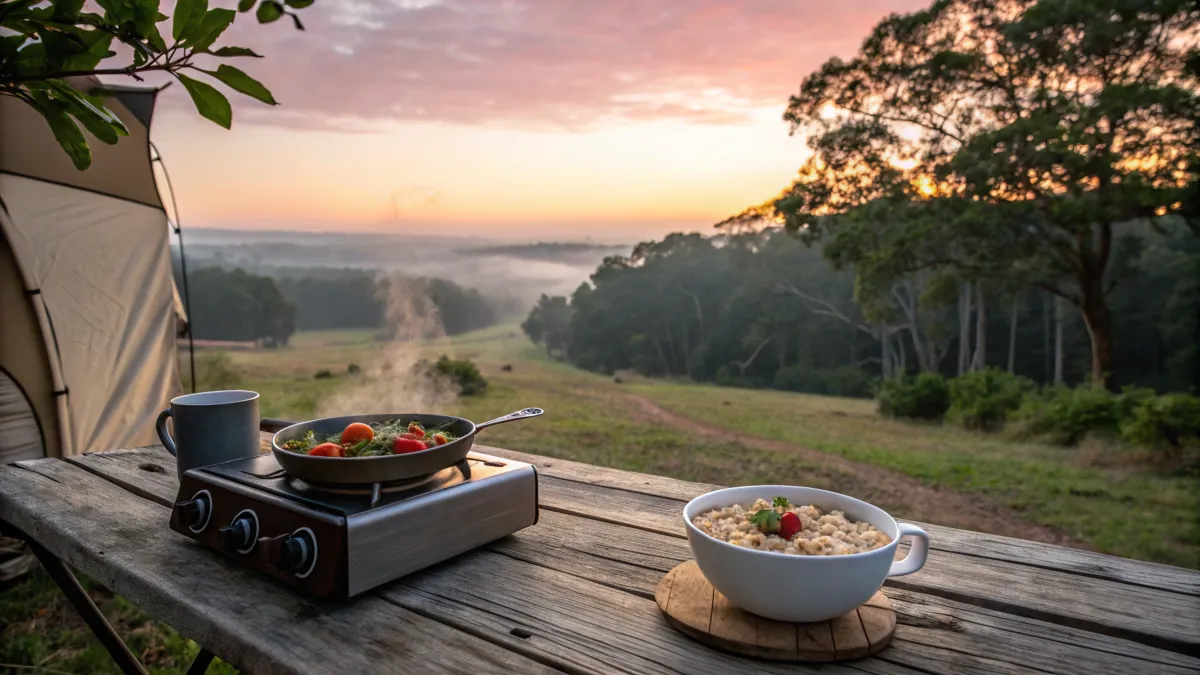When you’re hitting the trail for a backpacking adventure, breakfast is more than just the first meal of the day it’s fuel for the journey ahead. The right breakfast can make all the difference, giving you the energy and stamina to tackle rugged paths and long distances. But what makes a great backpacking breakfast? It should be lightweight, easy to prepare, and packed with nutrients. In this article, we’ll share the best backpacking breakfast ideas, covering everything from no-cook options to hearty meals that warm you up on chilly mornings. Let’s dive in and discover the perfect trail-friendly breakfasts for your next trip!
Table of Contents
Why Breakfast Matters on the Trail
The Role of Breakfast in Outdoor Activities
When you’re out in the wilderness, breakfast isn’t just about satisfying hunger. It’s about fueling your body for the physical challenges ahead. A good breakfast can help stabilize your blood sugar levels, ensuring consistent energy throughout the day. Skipping breakfast? That’s a surefire way to feel sluggish and fatigued. Whether you’re tackling a steep incline or setting up camp, having a nutritious meal to start your day is crucial.
Nutritional Needs for Backpackers
The physical strain of backpacking should be reflected in your diet. You’ll need foods that are high in calories and nutrient dense. Think carbs for quick energy, protein for muscle repair, and fats for long-lasting fuel. For instance, oats, nut butter, and dried fruits are excellent choices because they tick all the right boxes. Packing meals with these nutrients helps you stay strong and steady, no matter how rough the trail gets.
Quick and Easy Backpacking Breakfast Ideas
No-Cook Breakfast Options
Taking pre-packaged energy bars, which are lightweight and cleanup-free, is another easy idea. If you’re looking for more grab-and-go recipes, Simply Recipes has a variety of snack ideas that work well for early mornings.
Minimal Prep Breakfasts
When you have a few minutes to spare, minimal prep breakfasts can make the morning feel a bit more indulgent. A great option is a wrap filled with peanut butter, honey, and sliced bananas. This combination is not only delicious but also packed with energy-boosting nutrients. Alternatively, mix powdered yogurt with granola for a refreshing meal that adds protein to your day.
For creative takes on minimal prep breakfasts, check out Serious Eats.
Lightweight and Compact Breakfast Choices
Dehydrated Meals
Dehydrated breakfasts are ideal for backpackers looking to save weight without sacrificing variety. Freeze-dried options like scrambled eggs with vegetables or savory oatmeal with spices are lightweight, easy to pack, and only require hot water to prepare. Many outdoor brands offer ready-made meals that cater to different tastes, making them a versatile choice for your trip.
DIY Meal Prep Ideas
If you prefer to create your own meals, DIY dehydrated recipes are an excellent alternative. You can prepare combinations like quinoa with dried cranberries or couscous with almonds and cinnamon at home. By customizing your meals, you ensure they suit your preferences while staying lightweight. Seal them in zip-top bags for easy access on the trail.
Warm and Hearty Breakfasts for Cold Mornings
Hot Cereal Options
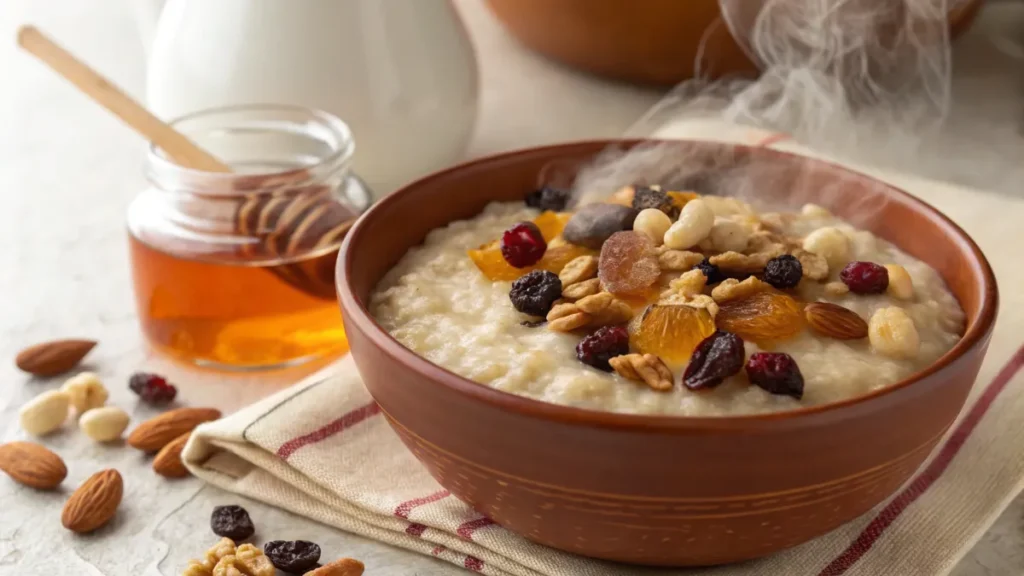
When the morning air is crisp and chilly, a hot breakfast can feel like a hug in a bowl. Options like cream of wheat or porridge are fantastic for warming up and starting your day with energy. Adding extras like powdered milk, nuts, or dried fruits can enhance the taste and nutritional value. These meals are easy to prepare just boil water, mix, and enjoy.
For a comforting spin, consider adding a dollop of honey or a sprinkle of cinnamon. For more creative lunch ideas, you can explore Canned Salmon and Rice Southern Style recipe on Charmed Recipes.
Breakfasts with a Portable Stove
If you’re carrying a portable stove, you can whip up more elaborate meals, like scrambled eggs with pre-cooked bacon. These meals take a little more effort, but they’re worth it when you need a hearty start. Another option is a simple pancake mix that only requires water.Pancakes are a fun, high-energy breakfast that is easy to transport.
For more choices, you may find some motivational recipes in the easy breakfast section of Charmed Recipes.
Budget-Friendly Backpacking Breakfast Ideas
Affordable Store-Bought Options
Backpacking doesn’t have to break the bank, and affordable breakfasts are surprisingly easy to plan. Store-bought instant noodles or ramen with a twist like adding dehydrated vegetables or powdered eggs can make a satisfying and budget-friendly meal. Energy bars and trail mix are also wallet-friendly options, especially when bought in bulk.
DIY Budget Meals
For those who like to prepare meals at home, DIY options can save even more. Buy bulk ingredients like oats, nuts, and dried fruits to create your own instant oatmeal packets. Preparing trail mix with a combination of raisins, sunflower seeds, and dark chocolate chips is another cost-effective and delicious idea. Not only are these meals cheap, but they’re also customizable to your taste.
Specialty Diet Breakfasts on the Trail
Vegan-Friendly Breakfast Ideas
Finding backpacking breakfast ideas that cater to a vegan diet isn’t as hard as it seems. A great option is plant-based protein powders that mix easily with water. Pair this with granola or dried fruit for added flavor and texture. Nut butter packets, combined with whole-grain crackers, provide a quick and satisfying meal that’s rich in protein and healthy fats.
Another easy choice is overnight oats made with powdered coconut milk and chia seeds. Just prepare them the night before, and you’ll have a delicious, no-cook breakfast ready to go.
Gluten-Free Options
For those avoiding gluten, there are plenty of simple solutions. Gluten-free oatmeal is an excellent base for a warm breakfast. Add dried berries or pumpkin seeds for extra nutrients and taste. Another idea is rice cakes topped with almond butter or a mix of honey and bananas. These meals are lightweight, easy to pack, and perfect for maintaining energy on the trail.
Both of these options prove that specialty diets can still offer plenty of variety, even in the great outdoors.
Essential Tips for Planning Backpacking Breakfasts
Packing Efficiently
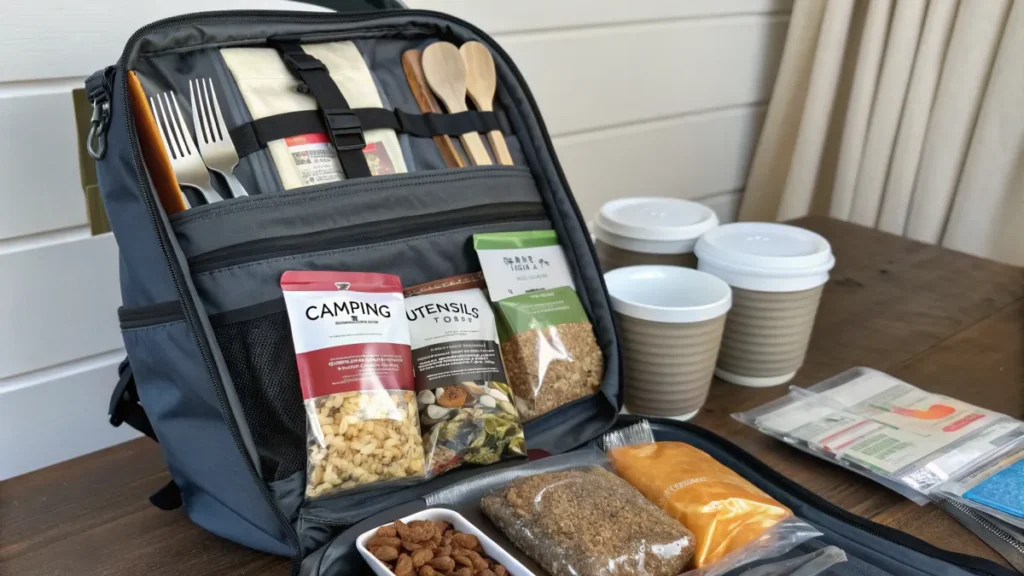
Packing efficiently is key when planning backpacking breakfast ideas. Multi-use ingredients like oats, nuts, and powdered milk can be used in various recipes, cutting down on bulk. Store each meal in resealable bags to save space and keep everything organized. Don’t forget to use lightweight utensils and collapsible bowls they’re game-changers for saving space.
Organizing your meals according to the day can also speed up the morning process, allowing you to concentrate on the trail rather than searching through your bag.
Testing Meals Before Your Trip
There’s nothing worse than realizing your breakfast doesn’t taste good once your miles into your hike. That’s why testing your meals at home is so important. Cook and taste your recipes in advance to ensure they’re both delicious and easy to prepare. Adjust the portions based on your needs to avoid waste and ensure you have enough energy for the day.
With a little planning, you can enjoy stress-free mornings no matter where your adventure takes you.
FAQs About Backpacking Breakfasts
What Are the Best Backpacking Breakfasts for Energy?
Many people ask about the best backpacking breakfast ideas for boosting energy. The answer depends on balancing carbohydrates, proteins, and fats. Foods like instant oatmeal with nuts and dried fruits provide quick energy while also being lightweight and easy to prepare. For longer-lasting fuel, include options like peanut butter wraps or protein-packed granola bars. These meals are not only portable but also packed with the nutrients needed for a long day on the trail.
How Do You Keep Breakfast Lightweight While Backpacking?
Another common question is how to pack light while still enjoying a good breakfast. Dehydrated meals are excellent because they weigh very little and take up minimal space. You can also focus on multi-purpose ingredients like powdered milk or nut butter, which work in various recipes. Using resealable bags for individual portions ensures your meals are compact and organized.
By choosing simple, nutrient-dense meals, you can keep your backpack light without compromising on quality.
Can You Cook Eggs While Backpacking?
Yes, cooking eggs while backpacking is possible! Pre-crack eggs into a leak-proof container before your trip to save space. On the trail, scramble them in a small pan with a bit of oil or pre-cooked bacon for a hearty breakfast. While this option requires a bit more effort, the payoff is a satisfying meal that feels like a luxury in the wilderness.
A Comparison Table of Backpacking Breakfast Options
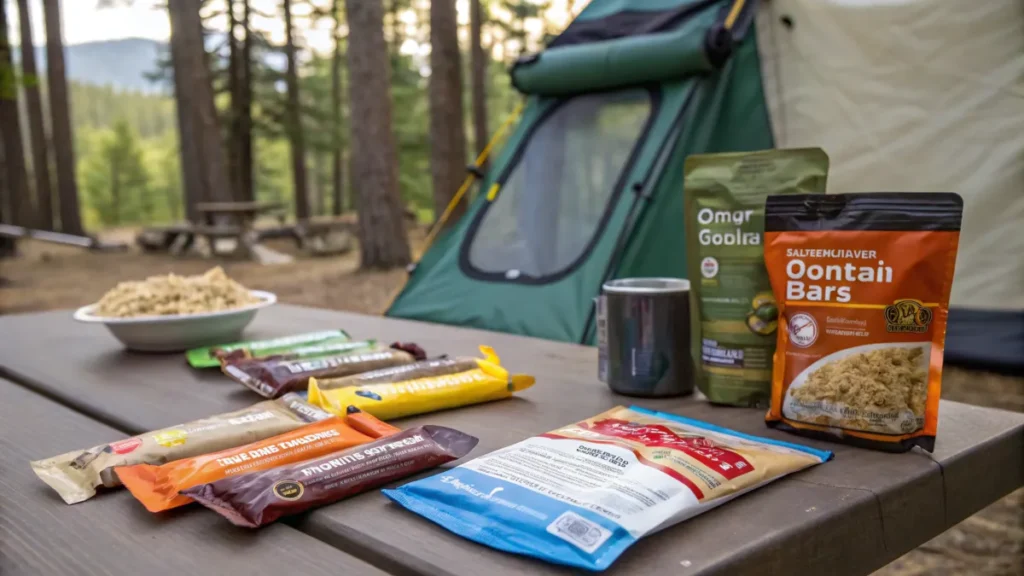
Choosing the right meal can feel overwhelming, so here’s a handy table comparing popular backpacking breakfast ideas. This table highlights preparation time, weight, and what each option is best suited for:
| Breakfast Type | Preparation Time | Weight | Best For |
|---|---|---|---|
| Instant Oatmeal | 2 minutes | Light | Quick energy boosts |
| Energy Bars | No prep | Very light | On-the-go convenience |
| Dehydrated Meals | 10 minutes | Moderate | Hot, satisfying breakfasts |
| Pre-Made Wraps | No prep | Light | Protein-rich portable meals |
| Pancakes (with mix) | 5–10 minutes | Moderate | A hearty, warm breakfast |
This table makes it easier to compare options and choose meals that suit your specific needs.
Benefits of a Well-Planned Backpacking Breakfast
Boosting Energy and Endurance
Starting your day with a solid breakfast on the trail has clear benefits. A well-planned meal provides the energy your body needs to handle tough terrains and long distances. Carbohydrates offer quick energy, while proteins and fats ensure you stay fueled for hours. For instance, a peanut butter wrap or a warm bowl of oatmeal with dried fruits can work wonders. These meals are not just easy to prepare but also perfect for keeping fatigue at bay.
Enhancing the Outdoor Experience
A tasty breakfast does more than fuel your body it lifts your spirits. There’s something about sipping hot coffee or enjoying a warm meal in the middle of nature that enhances the whole backpacking experience. A little planning goes a long way in turning a basic breakfast into a moment of comfort and joy, even on challenging mornings.
Common Mistakes to Avoid
Skipping Breakfast
It’s tempting to skip breakfast to save time, but doing so can lead to low energy and slower progress on the trail. A quick snack like an energy bar or instant oatmeal can be a lifesaver if you’re in a hurry. Remember, even a small meal is better than starting your day on an empty stomach.
Packing Too Much
Overpacking is another common mistake, especially with food. While it’s essential to have enough to eat, carrying too much can weigh you down. Stick to lightweight, nutrient-dense ingredients like dehydrated meals and multi-use items. Always portion your food in advance to avoid unnecessary bulk.
Environmental Impact of Backpacking Meals
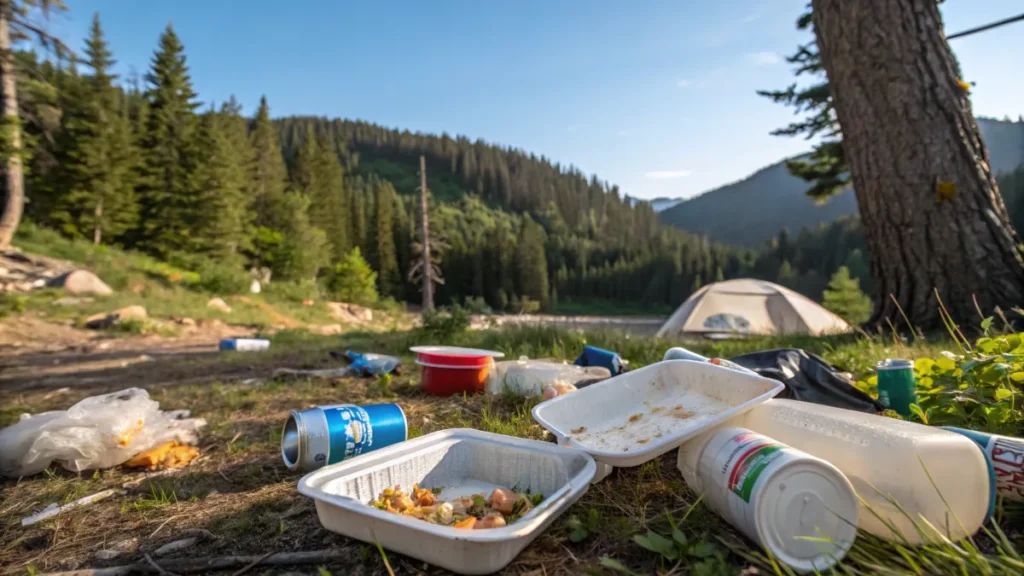
Choosing Sustainable Ingredients
One overlooked aspect of backpacking breakfast ideas is their environmental footprint. By opting for sustainably sourced ingredients, you can minimize waste and reduce your impact on the planet. Look for organic or locally produced options whenever possible. Items like oats, nuts, and dried fruits are not only nutrient-dense but also environmentally friendly when sourced responsibly.
Reducing Waste on the Trail
Pack meals in reusable containers or resealable bags to cut down on disposable waste. If you’re using dehydrated meals, remember to pack out all packaging to leave no trace behind. Compostable packaging is another option worth considering if you’re committed to reducing your trail waste. For more tips, explore articles on Serious Eats about sustainability in cooking.
Adapting to Weather Conditions
Cold Weather Breakfasts
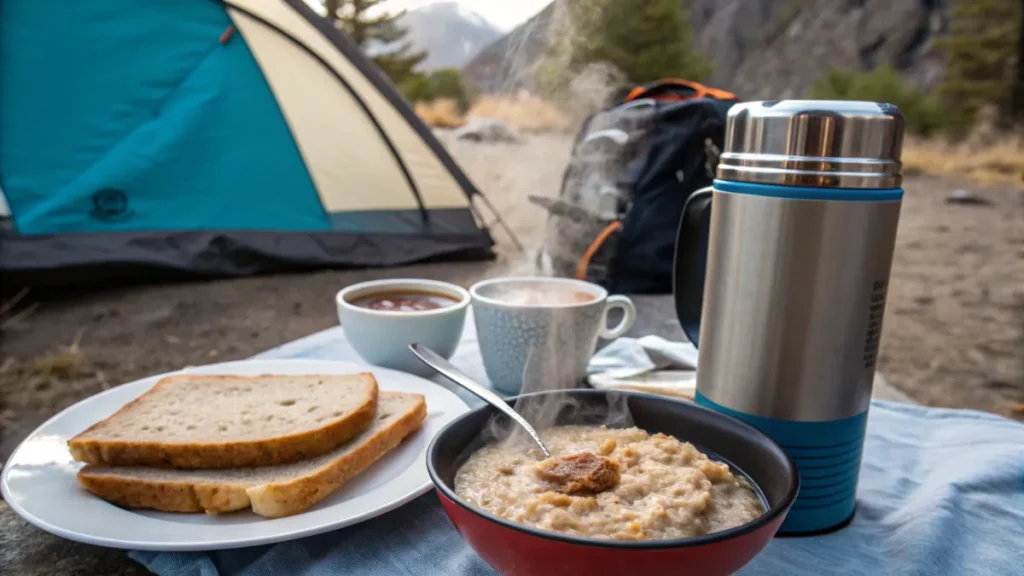
Your food should not only satisfy your hunger when backpacking in colder climates; it should also keep you warm. Hot cereals, like oatmeal or grits, provide both warmth and energy. Adding calorie-dense toppings like butter, honey, or peanut butter can give you an extra boost to fight the chill. Another option is instant soups paired with crackers for a savory, comforting breakfast.
Hot Weather Breakfasts
In warmer climates, lightweight and hydrating meals are ideal. Overnight oats made with powdered coconut milk and topped with fresh or dried fruits are a refreshing option. Smoothies using freeze-dried fruits and powdered milk can also be a great choice. These options ensure you stay energized without feeling too heavy or overheated.
Conclusion
Planning the perfect trail-friendly breakfast doesn’t have to be overwhelming. With the correct backpacking breakfast ideas, you can eat meals that are portable, simple to make, and full of energy for your journey. From no-cook options like energy bars and oatmeal to hearty, warm breakfasts that require a bit more effort, there’s a solution for every backpacker’s needs.
By testing your meals beforehand and packing efficiently, you’ll save time and space while ensuring you’re fueled for the day ahead. Whether you’re looking for budget-friendly choices, specialty diet options, or quick fixes, the key is to balance convenience with nutrition. So, grab your backpack, plan your meals, and hit the trail with confidence. Happy hiking and happy eating!

